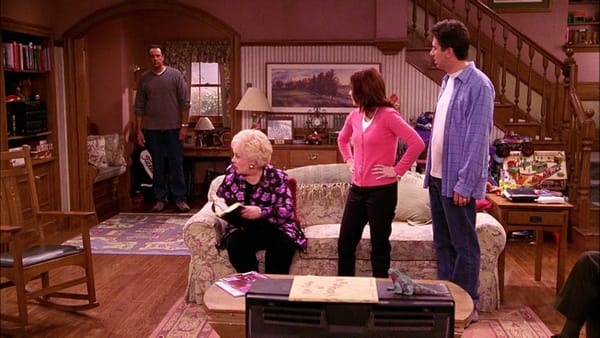Episodes: By implication

My natural inclination as a critic is to try to hook whatever I'm watching up to some larger emotional world outside of the film. This has gotten me in trouble before, when I've either left out a couple of the steps in my thought process or just wandered too far down my own brain stem. But for the most part, I think I am Not Bad at it, and have gotten steadily better the longer I've been doing this professionally.
This is all well and good if you're writing, say, episodic TV criticism. There, the audience comes to have a relationship with you. They know your byline, and your tastes, and they know when to take you seriously and when to understand you're joking and when they disagree with you (but hopefully gently). I still run into people who remember me from my Sopranos or Community or Mad Men reviews, and they don't just remember that I covered the show; they remember my coverage. That kind of relationship allows you a lot of latitude, and a lot of room to screw up, because your readers are giving you the benefit of the doubt.
But this gets trickier when what you're writing about becomes a discrete unit, that might be stripped of your name or even your publication. (I recently discovered a post quoting a piece I had written attributing it to "Political Forum," a site I've never even heard of, which turned out to have basically quote-posted said piece in bulk.) When one of my articles ends up on Facebook, yeah, it has my name and "Vox" down there at the bottom, but it mostly looks like any other article you might see on Facebook. It is stripped of all context, turned into another piece of content in an endless sea.
As a writer who really appreciated getting to build a relationship with readers at my last job, this has been terrifying, and it's something I've only just now started to get the hang of, started to understand. And in this context-less free-for-all, there is nothing readers hate more than being blindsided.
I think about it this way: At this point in time, it's really hard to write about anything without the specter of Donald Trump lurking in the background. You might like the guy; you might hate the guy. Either way, he's this huge anomaly in the way American life proceeds, this elephant in the room that informs everything else that happens. When I watch a TV show or movie, he's always there, lurking. When I read something, the same is true. My colleague Constance Grady wrote a little bit about how applying the "Trump filter" to pop culture becomes hard to avoid.
And yet, here's the thing: This isn't just true for me. It's true for you, too, because this is 2017, and we're all going through this together. (Hello, visitors from 2032. How are things?) So figuring out when to push that button, when to send the Trump signal shining into the sky in pieces that ostensibly have nothing to do with him, is a bit of a balancing act.
That's what I mean when I say readers hate being blindsided. They don't want to start reading a piece about the Resident Evil franchise and suddenly find they're reading about the demise of the filibuster or something, even if that mention is offhanded and off the wall. And yet critics also can't refrain from engaging with the world around them, and a big part of the world around them is the political climate. It's a trick of engaging -- but not too much.
I know this because I, too, am a reader, and many of my favorite publications have tripped over themselves to turn every other post into something about how anti-Trump the site's writers are (or something similar), and I increasingly just find it exhausting, because the references are scattershot, with no meat to them. They're just sort of there, to make sure everybody understands we're all on the same page. It's gotten a little better this week, as there's more of a sense that, yes, this is really happening. But it's still everywhere.
Increasingly, then, I try to figure out how to talk about this stuff without talking about this stuff. How deeply can I leave it buried while still making sure the audience understands what I'm talking about. It's tricky, because criticism, like all journalism, thrives on specific examples and evidence, on directly pointing to the thing you need to point to and saying exactly why you think it's significant. If you want to say "X reminds me of Mike Pence," well, then you need to say X reminds you of Mike Pence.
Sometimes, the work does all the heavy lifting for you. There's an upcoming TV show -- filmed before Trump's election -- in which there's a massive, massive women's march against a new government. I really don't need to point out the parallels there, because if you are an actively engaged news consumer, you'll get it. Other times, I'll have to do the heavy lifting for the work, because I think the connection to modern reality is pretty significant, but it might not seem that way on the surface. (I did a bit of this in this piece.) And in those cases, it's all about making sure every step of the argument is clear, so even if the reader disagrees, they'll still get where I'm coming from.
But the vast majority of stuff is going to exist in the grey middle -- kinda sorta about what's going on right now, but also kinda, sorta not about that. And in those cases, I like to flirt with being explicit, but leave things implicit. Let people decide on their own how much they think this resonates with the world outside of pop culture. Lead the horse to water, as it were, but make sure they're the one to take the drink.
It doesn't always work, to be sure, and the danger is pieces that feel half finished, like they're leaving conclusions dangling in mid-air. But sometimes, too little is better than too much, and in a journalism world that can feel like it's all Trump all the time, I do wonder if too little is the better course of action most of the time.
--
Episodes is published three-ish times per week, and more if I feel like it. It is mostly about television, except when it's not. Suggest topics for future installments via email or on Twitter. Read more of my work at Vox Dot Com.




